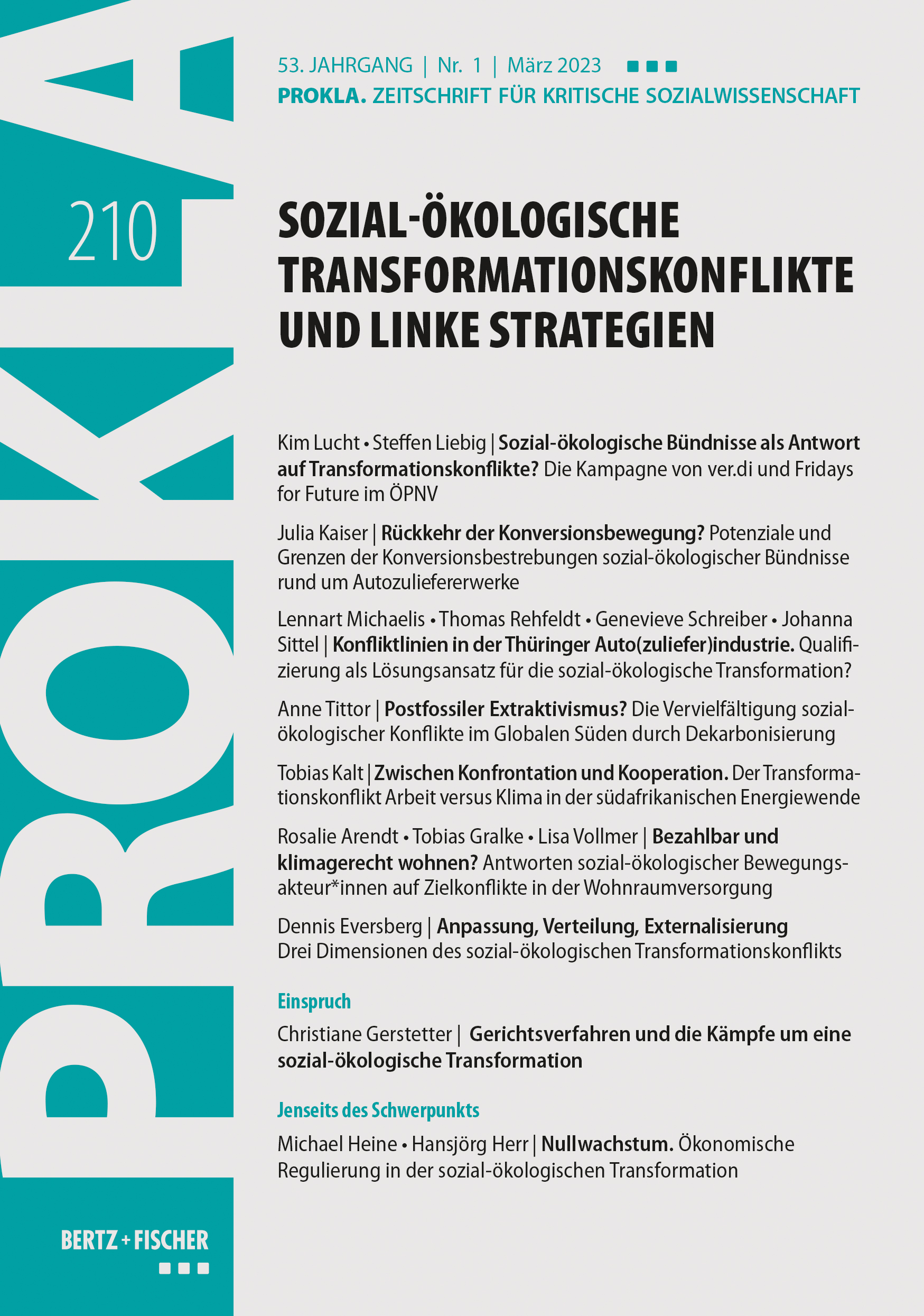Nullwachstum
Ökonomische Regulierung in der sozial-ökologischen Transformation
DOI:
https://doi.org/10.32387/prokla.v53i210.2035Schlagworte:
Ökologische Transformation, Nullwachstum , Nachfragekontrolle, InvestitionssteuerungAbstract
Die globale ökologische Lage spitzt sich so zu, dass eine nur angebotsseitige Lösung unzureichend ist. Daher sollte das Wachstum durch eine Nachfragesteuerung in den Ländern des Globalen Nordens auf ein niedriges Niveau oder auf null gesteuert werden. Das ist nur möglich, wenn die Investitionen durch ein makroökonomisch gegebenes Kreditvolumen, staatliche Unternehmen zur Erfüllung öffentlicher Aufgaben und eine Veränderung der Eigentumsstruktur von Aktiengesellschaften gesteuert werden. Entsprechend wäre die Einkommens- und Vermögensverteilung anzupassen. Auch andere Bereiche bedürften tiefgreifender Reformen und Veränderungen, die im existierenden kapitalistischen System kaum vorstellbar sind.
Downloads
Literaturhinweise
AK Postwachstum (2016): Wachstum – Krise und Kritik. Die Grenzen der kapitalistisch-industriellen Lebensweise. Frankfurt/M.
Besters, Hans (1982): Neue Wirtschaftspolitik durch Angebotslenkung. Baden-Baden.
Bolt, Jutta / van Zanden, Jan Luiten (2020): Maddison style estimates of the evolution of the world economy. A new 2020 update. URL: https://www.rug.nl/ggdc/historicaldevelopment/maddison/releases/maddison-project-database-2020, Zugriff: 14.7.2022.
Brand, Ulrich / Wissen, Markus (2022): Emanzipatorische Perspektiven im »Anthropozän«. Über Grenzen des grünen Kapitalismus und die Notwendigkeit einer radikalen Alternative. In: PROKLA 207 52(2): 263-284. DOI: https://doi.org/10.32387/prokla.v52i207.1992.
Canadell, Pep u.a. (2021): Global emissions almost back to pre-pandemic levels after unprecedented drop in 2020, new analysis shows. URL: https://theconversation.com/global-emissions-almost-back-to-pre-pandemic-levels-after-unprecedented-drop-in-2020-new-analysis-shows-170866, Zugriff: 12.7.2022.
Carbon Brief (2021): Historical responsibility for climate change is at the heart of debates over climate justice. URL: https://www.carbonbrief.org/analysis-which-countries-are-historically-responsible-for-climate-change/#percapita, Zugriff: 10.7.2022.
Dünhaupt, Petra / Herr, Hansjörg (2020): Trade, Global Value Chains and Development: What Role for National Development Banks? In: Vierteljahreshefte zur Wirtschaftsforschung 89(3): 9-33. DOI: https://doi.org/10.3790/vjh.89.3.9.
EJEEP (2022): De-growth, Zero Growth and/or Green Growth? Macroeconomic Implications of Ecological Constraints. In: European Journal of Economics and Economic Policies: Intervention 19(1): 16-173. DOI: https://doi.org/10.4337/ejeep.2022.01.03.
European Environment Agency (2022): Growth without economic growth. Kopenhagen.
Fargues, Philippe (2022): Population, migration and the preservation of the planet (12.12.2022). URL: https://progressivepost.eu/population-migration-and-the-preservation-of-our-planet/, Zugriff: 7.1.2023.
Grabbe, Heather / Poto?nik, Janez / Dixon-Declève Sandrine (2022): International Systems Change Compass. The Global Implications of Achieving the European Green Deal, Joint Report of SYSTEMIQ, Club of Rome and Open Society European Policy Institute. Brüssel.
Hein, Eckhard / Jimenez, Valeria (2022): The macroeconomic implications of zero growth: a post-Keynesian approach. In: European Journal of Economics and Economic Policies: Intervention19(1): 41-60. DOI: https://doi.org/10.4337/ejeep.2022.01.05.
Herr, Hansjörg (2022): Transformation of capitalism to enforce ecologically sustainable GDP growth: Lessons from Keynes and Schumpeter. In: European Journal of Economics and Economic Policies: Intervention 19(1): 159-173. DOI: https://doi.org/10.4337/ejeep.2022.01.11.
Hickel Jason / Kallis, Giorgos (2019): Is Green Growth Possible? In: New Political Economy 25(4). DOI: https://doi.org/10.1080/13563467.2019.1598964.
Hickel, Jason u.a (2022): National responsibility for ecological breakdown: a fair-shares assessment of resource use, 1970-2017. In: Lancet Planet Health 6(4): 342-349. DOI: https://doi.org/10.1016/S2542-5196(22)00044-4.
Holtermann, Felix (2016): Zwischen Utopie und Umsetzung. Die Wachstumskritik im politischen Diskurs. Münster.
IPCC (Intergovernmental Panel on Climate Change) (2021): Sechster IPCC-Sachstandsbericht (AR6) Beitrag von Arbeitsgruppe I: Naturwissenschaftliche Grundlagen (29.10.2021). URL: https://www.de-ipcc.de/media/content/Hauptaussagen_AR6-WGI.pdf, Zugriff: 6.8.2022.
– (2022): Summary for Policymakers: Climate Change 2022: Impacts, Adaptation, and Vulnerability. Contribution of Working Group II to the Sixth Assessment Report of the IPCC. Cambridge.
Keynes, John Maynard (1926): The End of laissez-faire. London.
– (1930): Vom Gelde. Berlin.
– (1933): Publiziert ohne Titel. In: G. Clausing (Hg.) Der Stand und die nächste Zukunft der Konjunkturforschung: Festschrift für Arthur Spiethoff. München: 123-125.
– (1936): Allgemeine Theorie der Beschäftigung, des Zinses und des Geldes. Berlin.
– (1969 [1943]): Proposals for an International Currency (or Clearing) Union. In: The International Monetary Fund 1945-1965, Band 3, hg. v. Keith Horsefield. Washington/DC: 19-36.
– (1978): Towards the General Theory. In: Johnson, Elizabeth / Moggridge, Donald (Hg.): The Collected Writings of John Maynard Keynes. Cambridge.
Lange, Steffen (2018): Macroeconomics without Growth. Sustainable Economies in Neoclassical, Keynesian and Marxian Theories. Marburg.
Marx, Karl (2005 [1890]): Das Kapital. Kritik der politischen Ökonomie. Der Produktionsprozess des Kapitals. Berlin.
– (2003 [1894]): Das Kapital. Kritik der politischen Ökonomie. Der Gesamtprozess der kapitalistischen Produktion. Berlin.
Mishel, Lawrence / Kandra, Jori (2021): CEO pay has skyrocketed 1,322% since 1978 (10.8.2021). URL: https://www.epi.org/publication/ceo-pay-in-2020/, Zugriff: 6.8.2022.
Rockström Johan (2015): Bounding the Planetary Future: Wy we need a Great Transition, A Great Transition Initiative. URL: http://www.greattransition.org/images/GTI_publications/Rockstrom-Bounding_the_Planetary_Future.pdf, Zugriff: 13.7.2022.
– u.a. (2009): Planetary Boundaries: Exploring the Safe Operating Space for Humanity. In: Ecology and Society 14(2). URL: https://www.ecologyandsociety.org/vol14/iss2/art32/, Zugriff: 13.07.2022.
Roser, Max u.a. (2022): World Population Growth. URL: https://ourworldindata.org/world-population-growth, Zugriff: 14.7.2022.
Schmelzer, Matthias / Vetter, Andrea (2019): Degrowth/Postwachstum zur Einführung. Hamburg.
Schumpeter, Joseph Alois. (1911): Theorie der wirtschaftlichen Entwicklung, Leipzig.
– (1975 [1942]): Kapitalismus, Sozialismus und Demokratie. München.
Stiglitz, Joseph Eugene (2020): Der Preis des Profits. Wir müssen den Kapitalismus vor sich selbst retten! München.
Stiglitz, Joseph Eugene / Uy, Marilou (1996): Financial Markets. Public Policy, and the East Asian Miracle: World Bank Observer 11(2): 249-276. DOI: https://doi.org/10.1093/wbro/11.2.249.
Tax Foundation (2022): Historical U.S. Federal Individual Income Tax Rates & Brackets, 1862-2021. URL: https://taxfoundation.org/historical-income-tax-rates-brackets, Zugriff: 2.8.2022.
UN (2021): Full NDC Synthesis Report: Some Progress, but Still a Big Concern (17.9.2021). URL: https://unfccc.int/news/full-ndc-synthesis-report-some-progress-but-still-a-big-concern, Zugriff: 13.7.2022.
WBGU (Wissenschaftliche Beirat der Bundesregierung Globale Umweltveränderungen) (2011): Welt im Wandel. Gesellschaftsvertrag für eine Große Transformation. Berlin. 2011.
Werner, Richard (2003): Princes of the Yen: Japan’s Central Bankers and the Transformation of the Economy. New York.






